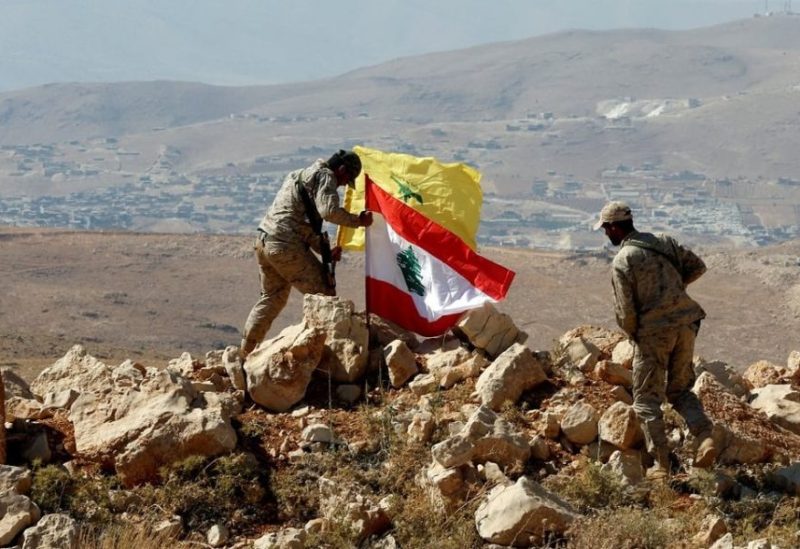
Hezbollah fighters fly movement's standard next to Lebanon's flag in Jouroud Arsal (Reuters)
Information is shared by more than one prominent diplomatic source that the Israeli ground operation has begun. But what is not clear, or perhaps Hezbollah will not intend to clarify, is whether its position at the start of the Israeli attack on Gaza by air in the wake of the October 7 operation remains unchanged, or whether a modification has occurred to it.
When the air attack began, Hezbollah said that if Israel were to attack by ground, it would intervene in the battle. Is this position still in effect, or is it that, as a result of the development of unprecedented international pressure on him, which was communicated from all Western countries to the Lebanese government, to inform him clearly, in order not to interfere, his position will change to respond to the pressure.
The question for the sources is: Did Hezbollah reach new conclusions as a result of the messages it received through the government or through the mediators, with whom he works directly, such as France and Qatar, in light of the increase in the number of martyrs to nearly 50 martyrs, and the modern technologies used in the Israeli response.
Neither party has information about the truth of its position. Historically, according to sources, the party does not provide information to reassure or comfort the enemy, but rather maintains silence as part of the strategy it follows. If the party wants to enter or expand the battle, this will appear within days, with sources suggesting that it will not intervene.
The sources believe that there are many factors preventing his intervention, namely: the internal political atmosphere is not supportive of any intervention of this kind or expanding the war and including Lebanon. Everyone is aware of the killing, destruction and tragedies it will cause, as well as a bad financial and economic situation. Then there is the international information he receives requesting that he not intervene. Hezbollah’s internal situation is good, as well as internationally, given that it is the focus of attraction from the whole world, as it has been informed of certain preparations towards it on the condition that it does not enter the war.
Therefore, the sources say that the party will not transform its position from a polarization center to being an outcast on the current map, internally and internationally, as things are going in its favor. So why would he sacrifice all of that, even if he did not contribute to expanding the war, he might suffer some price? Why would he enter into a war whose strategic cost would be high, especially under a merciless right-wing government in Israel, and no international organizations that contributed to stopping the war? For the sake of two Israelis, Israel launched the 2006 war. Today, in light of what happened on October 7, it has a license to kill from the West.
Now, time is running out for Israel, and the United Nations General Assembly’s resolution is an indication that Palestine is not abandoned, and the United Nations is not satisfied with the open license to kill, even if it receives international sympathy for what happened on October 7. Hence, the work of the Arab Group at the United Nations resulted in mobilizing support, and it was able to bring together 121 countries in favor of the resolution, compared to 12 countries against it. This carries great meaning about the world’s dissatisfaction with the bloody scenes that affected children and women. Therefore, the margin of time began to narrow for Israeli Prime Minister Benjamin Netanyahu to achieve his goals.
The General Assembly’s decision is the first indication that the license is no longer open, and that it is not permissible to spend six months killing people. Therefore, sources report that a Security Council resolution, similar to the General Assembly resolution, may be issued within two weeks.
As for Lebanon’s role in all of this, the sources indicate that Lebanon was at the heart of the intense action undertaken by the Arabs through joint action, smart and sober diplomacy, and through its permanent representative to the United Nations, Ambassador Hadi Hashem. Lebanon was supportive, sponsoring, and mobilizing for the issuance of the resolution, and not just voting for it. Lebanon participated in the “lobbying” efforts to overthrow the Canadian amendment in the diplomatic battle, which considered Hamas’ actions as terrorist. Lebanon and the Arabs used a non-extremist international language that was accepted by Western countries, in addition to smart wording that won international votes. The resolution included the Arab demands approved by the League, namely: a truce, cessation of hostilities, opening humanitarian corridors to provide aid, and stopping the process of displacement and transfer towards Egypt or any other country.